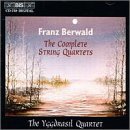| All Artists: Franz Berwald Title: Berwald: The Complete String Quartets Members Wishing: 0 Total Copies: 0 Label: Bis Release Date: 11/19/1996 Album Type: Import Genre: Classical Style: Chamber Music Number of Discs: 1 SwapaCD Credits: 1 UPCs: 789368463428, 7318590007594 |
Search - Franz Berwald :: Berwald: The Complete String Quartets
 | Franz Berwald Berwald: The Complete String Quartets Genre: Classical
|
Larger Image |
CD Details |
CD ReviewsBerwald's Strangely Neglected String Quartets Given Strong P J Scott Morrison | Middlebury VT, USA | 10/23/2006 (5 out of 5 stars) "Franz Berwald (1796-1868) is primarily known, of course, for his symphonies and they have secured a place, albeit not quite central, in the orchestral repertoire. What is strange is that his three string quartets, which are every bit as excellent as his symphonies, have not secured anything other than a very marginal place in concert programs of the present day. Until this recording was made in 1997 the three quartets had not been recorded, although I recall that the Chilingirian Quartet recorded a couple of them.
The First Quartet (1818) was written a good thirty years before the Second and Third (both from 1849), and Berwald, essentially self-taught, was only twenty-two when he wrote it. Beethoven and Schubert were still alive and writing music; Haydn had been dead only a few years. It is clear that Berwald had studied their works, particularly the early and middle Beethoven quartets and all of Haydn's extraordinary oeuvre. The First Quartet is confidently constructed. In the usual four movements, it sounds a bit like Beethoven but there are some unusual harmonic twists that, it turns out, would later be seen to be characteristic of Berwald's personal style. What is so amazing, though, is that Berwald's handling of a large form -- the quartet lasts over half an hour, much longer than the two later quartets -- is remarkably self-assured. This ability to handle big forms would be seen again and again in his symphonic output. At the time of this quartet, though, he had not yet written a symphony. The Second Quartet is terse yet lyrical. By now, it seems, Berwald had digested Beethoven's late quartets and although it does not break new ground, the handling of formal concerns is influenced by Beethoven's experiments in that area. The Third Quartet, though, charts new territory for Berwald. It is in five movements that are played without pause and is among the pioneers of arch form. Construction is almost palindromic with a scherzo enclosed inside two slow movements which are themselves enclosed in the outer fast movements. More dramatic than the earlier quartets, it reminds me in some ways of Berwald's Sinfonie Sérieuse, not least because the Scherzo is embedded in the slow movement. The Yggdrasil Quartet plays with a lean and sinewy yet refined tone that is appropriate for the quartets, especially the Second and Third. They convey both the drama and lyricism inherent in these romantic quartets. Recorded sound is excellent. There is some air around the quartet's sound so that the impact of the recorded sound is immediate without being claustrophobic. Recommended. Scott Morrison" |

 Track Listings (13) - Disc #1
Track Listings (13) - Disc #1